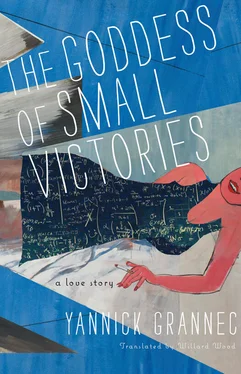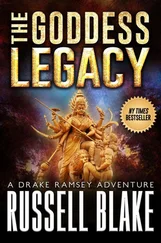“Already? You must bathe in the stuff!”
“Gödel, you should visit a doctor instead of medicating yourself like that.”
“Doctors are incompetent for the most part. I have the situation under control.”
Herr Einstein kneaded his shoulder.
“Take a little break, my friend! Go on vacation with Adele! She needs one too.”
“I’m busy.”
“We’re always too busy. And our bodies shout what our minds refuse to admit.”
“You can’t possibly understand, Herr Einstein. You’re indestructible.”
“I have been through it myself! I had just separated from Mileva, my first wife. I had written ten articles and a book in less than a year and lost fifty-five pounds. I suffered the tortures of hell. I thought I had an ulcer, maybe even cancer! I was just overworked. A little rest, a good doctor … a good cook — and life gets back on track!”
A stylish young woman in a tight-waisted suit, sporting white gloves and a feathered hat came toward us. She smiled as she recognized our famous friend. The two men turned to admire her swaying gait as she walked past. I swatted Kurt with my purse, making Herr Einstein laugh.
“Life gets back on track, and woman gets a little of her own back.”
Albert never talked about Mileva, his first partner. His second wife and cousin, Elsa, had died of heart problems in 1936, a year after they moved to 112 Mercer Street. Since then, the physicist had lived in a gynaeceum devoted to his comfort that included his sister, Maja, his stepdaughter, Margot, and his secretary, Helen Dukas. Einstein enjoyed the company of women, a fact he freely admitted, and he also expressed quite crude misogynistic sentiments. Rumor had it that Albert’s mother had disliked Mileva intensely, forcing the couple to keep their relation secret for a long time. It was something we had in common, the only thing. The first Frau Einstein had been a scientist. The marriage had disintegrated shortly before World War I and ended in divorce. Mileva stayed in Switzerland, where she raised their two sons. The younger, Eduard, was diagnosed with schizophrenia and had to be put in a mental hospital. There was also talk of an earlier child, a daughter who disappeared in the chaos of history. Albert’s life, like that of most mortals, was packed with tragic incidents, more or less shameful secrets, and disillusions.
“Couldn’t we cut across through those houses? Why do you make your route longer by walking to the end of Mercer?”
“My dear Adele, if I start changing my habits now, I’m absolutely certain to lose my way! I have no sense of direction. Out on the water, I am constantly getting lost! And if you only knew the number of times I’ve had to call for a tow truck.”
“That’s hardly going to convince us to come sailing with you again.”
“You’ll always find an admirer to help you, Herr Einstein.”
“I heard a strange story. Apparently, a motorist ran into a tree because he was so busy watching you?”
“Only two things are infinite, Adele. The universe and the stupidity of man. And I’m not entirely sure about the universe!”
The public never reacted to my dear husband with much enthusiasm. He had a way of throwing cold water on even his most ardent admirers, all the while lamenting his ostracism. Einstein found his celebrity a disaster: tourists came to visit his street as though it were a zoo. Hounded by requests, he barely found the time to work. He concluded, not without vanity, that fame would make him stupid. A common affliction in his eyes.
“People respond to you, Herr Einstein. They like you.”
“I want to know why! The other day, a letter came to me from a young girl. She wanted to know if I really existed or if I was like Santa Claus! They’re ready to have me stuffed and mounted so they can exhibit me next to Mickey Mouse.”
“You’re the white-haired sage in a world gone mad.”
“You’re wrong, my friend. I represent the dream of science in a form accessible to everyone. Relativity in a cardboard box and wrapped with a bow. My first atomic bomb in a kit.”
“Your sense of humor is so dark.”
“It’s Jewish humor, Gödel. Derision is the only weapon against absurdity. Talking about horror, I heard a good one recently. Three scientists in a nuclear laboratory get a big dose of radiation. They’re all going to die, but they’ll be granted a last wish. The Frenchman asks to have dinner with Jean Harlow. The Englishman asks to meet the queen. The Jew … asks for a second opinion.”
We laughed politely. Albert had a knack for pat jokes.
“Cynicism doesn’t become you, Herr Einstein. I prefer to think of you as an incarnation of wisdom.”
“I’m worried that posterity will see me more as the son of a bitch who invented the bomb. 20My apologies, Adele.”
“No need. I’ve been known to make a New York cabbie blush.”
The old man fingered his earlobe. Surprising me completely, my husband patted him affectionately on the shoulder.
“No one will hold you responsible for that, Professor. You’re not personally to blame for Hiroshima.”
“I know. I wrote that equation, E = mc 2, without thinking that thirty years later — boom! — it would contribute to thousands of deaths in a war already won. Technical progress is like an ax that someone has put in the hands of a psychopath.”
“No one blames Newton for having identified gravity, although it determines the ax’s path.”
“Don’t take this wrong, Gödel, but I sometimes wonder if we live in the same world. Do you see me as a kind of Gepetto, a puppet master?”
“I’m not that simple. But I have to admit that I am very fond of cartoons.”
“You’re a walking paradox, my friend. How can you go from Leibniz to Walt Disney without a tremor?”
“I don’t see any contradiction. Each brings me relief from the other.”
“We have been to see Snow White at least five times.”
“And which dwarf is your husband? Bashful? Doc?”
“Grumpy, for sure!”
“Are you Snow White, Adele?”
“I’m too old for the part.”
My husband shot me an angry look. I had no right to talk ironically about our relations, even if Albert had never had illusions about his friend’s susceptibility. In our fairy tale, it was I who had awakened Kurt from a long sleep. I’d saved him from many a personal dragon and a few family witches.
“Laugh if you like! To me, only fables represent the world as it should be. They give it meaning.”
“Dear Gödel, what is incomprehensible is that the world should be comprehensible.”
Einstein lowered his head by way of politely ignoring two passersby who were on the point of accosting him.
“I have again put on two socks that don’t match. Margot won’t let me hear the end of it. Now there’s another mystery. Where do these blasted socks disappear to?”
“A conundrum that Kurt has never been able to solve!”
“To some space-time singularity, most likely, along with our hopes and our youth.”
“You are in form, Gödel! Humor? Poetry? What did you have for breakfast this morning?”
“Maybe we need to turn the question around. Why does the other sock not disappear?”
“By God! You’re right, Adele. A problem without a solution is a problem that has been poorly framed. Is the election of the exiled sock subject to determinism? I’m going to write Pauli and ask him. A further extension of quantum physics. It wouldn’t surprise me if he unearthed a little matrix to explain it. What do you think, Gödel? Here’s an exciting subject for your article. The relativist washing machine!”
“I already have a subject for my article.”
“What is this about, Kurt? You haven’t mentioned it.”
Читать дальше












